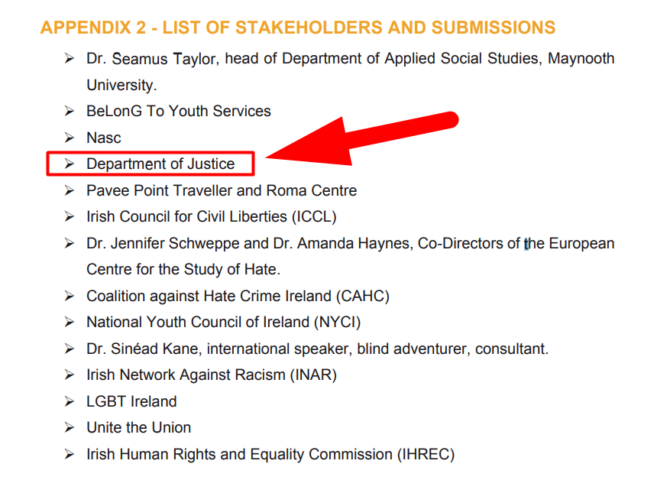This week, in response to a question by Gript.ie Justice Minister Helen McEntee defended her hate speech bill, saying that she had taken onboard “recommendations from the Joint Oireachtas Committee.”
Asked about public support for her bill, the Minister said that the Committee themselves “had an open consultation, and engaged across a broad spectrum of individuals.”
"In what way is this credible?": Irish Justice Minister Helen McEntee is asked how activists and government-funded NGOs who have campaigned for hate speech laws for years can be cited as evidence that her hate speech bill is popular.#gript pic.twitter.com/50XiZ7S2t3
— gript (@griptmedia) July 19, 2023
By this, McEntee was referring to the Oireachtas Joint Committee on Justice, which published a report on the hate speech bill last April. Sitting on the Committee were 14 politicians – 3 from Fianna Fáil, 3 from Fine Gael, 2 from the Green Party, 2 from Sinn Féin, 1 from Labour, and 3 Independents.
All of these parties have vocally advocated for hate speech laws for years, with only one Independent Senator (Michael McDowell) being an outspoken opponent.
Moreover, the report lists 14 “stakeholder” groups and individuals who were consulted about the hate speech bill. Every single one of these unanimously supported hate speech laws, and among the organisations consulted was Justice Minister Helen McEntee’s own Department.
Included in this list are State-funded NGOs such as BeLonGTo, Nasc, Pavee Point, the National Youth Council of Ireland (NYCI), the Irish Network Against Racism (INAR), and LGBT Ireland. These are campaigning groups that have advocated for hate speech laws for years, and which receive large sums of money from the government annually.
The list is also padded with groups that contain other groups. For example, it includes the “Coalition against Hate Crime Ireland (CAHC)”, which is a collection of NGOs including INAR, Pavee Point, Nasc, the NYCI, and the Irish Council for Civil Liberties, which is included in the list elsewhere. The list also includes Unite the Union, which is a member of INAR. In other words, several of the entries are arguably repeats of each other.
It contains a small number of academics, including Dr. Jennifer Schweppe and Dr. Amanda Haynes, Co-Directors of the European Centre for the Study of Hate. This is a University of Limerick initiative which is funded by the Irish government and the European Union. Both Haynes and Schweppe explicitly support McEntee’s hate speech bill, with Schweppe calling it “long overdue” and “hugely significant.” She also previously said that “it’s a good start to legislate against hate.”
TLRD: this is a legislative development which is long overdue and a hugely significant step in Irish law, addressing as it does one of the key social fissures in our society which causes significant harm to victims, communities, and society 2/
— Professor Jennifer Schweppe (@jschweppe) November 8, 2022
It also includes submission from self-described “Diversity and Inclusion Consultant” Dr. Sinead Kane, who called the government’s bill a “positive proposal” because it will “contribute to a wider deterrence of hateful speech.” And it included a submission from Dr. Seamus Taylor, who recently claimed on RTÉ Prime Time that “far right groups” conducted an “orchestrated campaign” to “say no” to the government’s planned hate-crime legislation as part of the online consultation.
When Gript’s Gary Kavanagh asked him to provide evidence of this, however, he did not provide any.
When it was put to RTÉ that Sen McDowell’s comment had not served to challenge Dr Taylor, as Dr Taylor had made multiple claims of fact, not opinion, RTÉ said that “there was a variety of opinion on the programme”, and that they had no further comment.https://t.co/4QeUrGlJlh
— gript (@griptmedia) July 10, 2023
The list includes the Irish Human Rights And Equality Commission (IHREC) – a state-run body set up by Fine Gael in 2014, which receives €7.6m annually from the government. IHREC has been calling for the government to “combat hate speech online” for years. And it includes the Irish Council for Civil Liberties, which supports hate speech laws, and which receives money from the European Commission, George Soros’ Open Society Foundations, the State-run and government-funded Irish Human Rights and Equality Commission, and the Department of Foreign Affairs.
In short, of the 14 groups that weighed in on the legislation in this report, at least 11 receive funding directly from the Irish government.
Gript recently reported that Minister McEntee had claimed that “independently facilitated” workshops on hate speech laws were positive. But virtually all of these workshops were run by government-funded NGOs and self-described activists who support such laws.
Helen McEntee says that “independently facilitated” workshops on hate speech laws were positive. But virtually all of these workshops were run by government-funded NGOs and self-described activists who support such laws. @Ben_Scallan reports:#gripthttps://t.co/e97YJRsZGB
— gript (@griptmedia) July 7, 2023
Gript previously revealed that the Irish government is driving ahead with the proposed hate speech bill, even after more than 73% of individual responses to their public consultation expressed negative views about the idea.
GRIPT EXCLUSIVE: The Irish government is driving ahead with the proposed hate speech bill, even after more than 73% of responses to their public consultation expressed negative views about the idea.#gripthttps://t.co/rcKnzWZ954
— gript (@griptmedia) May 3, 2023
When asked about this, Taoiseach Leo Varadkar defended disregarding the results of the consultation, arguing that “very often” such consultations are hijacked by “campaigning groups” and are not “reflective of public opinion.”
Taoiseach Leo Varadkar defends disregarding the results of the public consultation on "hate speech" laws, arguing that "very often" such consultations are hijacked by "campaigning groups" and are not "reflective of public opinion."#gript pic.twitter.com/X6EC0uF6NO
— gript (@griptmedia) May 4, 2023
